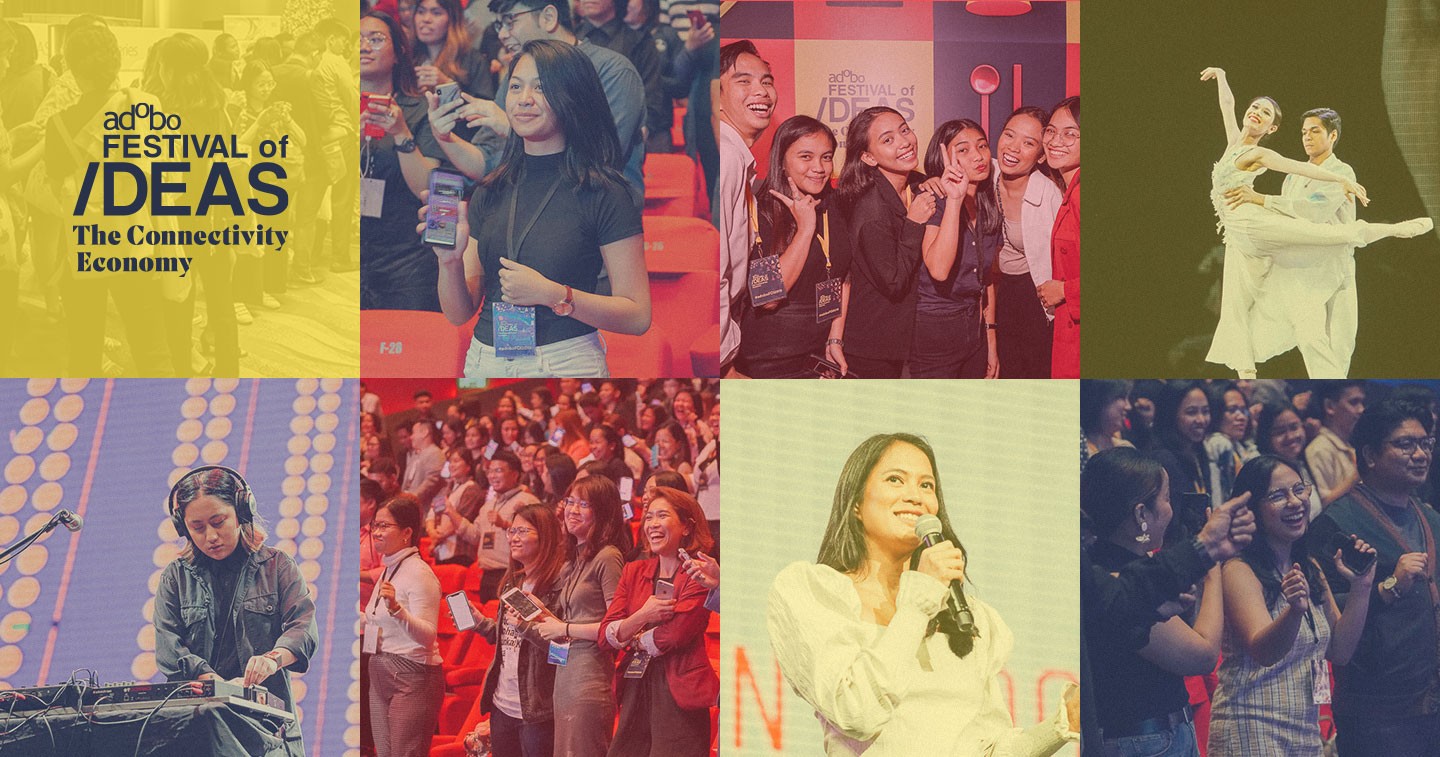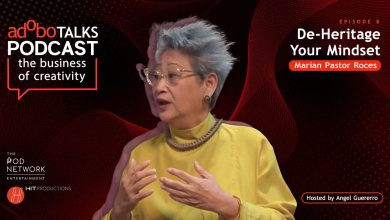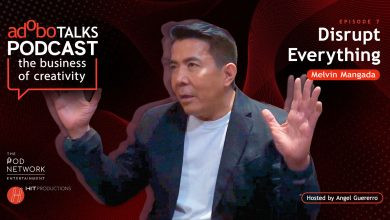MANILA, Philippines — Introducing a new organism called “The Connectivity Economy,” the adobo Festival of Ideas 2019, which took place on December 5, 2019 at the Newport Performing Arts Theater in Resorts World Manila, brimmed with new concepts and innovations to say the least. This year’s festival is an exploration of how The Connectivity Economy is formed when different sectors break their borders and learn to connect and collaborate with each other. There are billions of these sectors, but primarily explored were Data & Technology, Sustainability, Education, Entertainment, Infrastructure, Food, Business, Science, Health, People, Mobile, Makers, Arts & Culture, Sound, and Media & Communications.
“In a world where everything is connected, we have realized that collaboration, over competition, will drive innovation into the future. When we work together, we find more ways to solve the problems of the world, we get inspired to go beyond expectations, and create solutions unheard of before,” explained adobo magazine’s President, Founder, & Editor-In-Chief Angel Guerrero.
In the spirit of collaboration and connectivity, the adobo Festival of Ideas partnered up with several entities to come up with an event that fully encapsulates the theme. Visuals were created together with Wunderman Thompson Philippines who came up with the iconography, while Acid House produced 3D renders of the images.
![]()
Through Facebook’s Spark AR, Acid House also created two augmented reality filters that can be accessed through Instagram and Facebook Camera. The first filter launched ahead of the event was a Selfie Filter that featured the sector icons floating around in a bed of yellow tint.
The other filter was a 3D augmented reality art installation anchored on the adobo Festival of Ideas key visual that was “exhibited” during the festival itself at the foyer of the theater.
And to fully demonstrate what The Connectivity Economy can look like, the adobo Festival of Ideas worked closely together with Wunderman Thompson Philippines, Acid House, and Hit Productions to produce a video that shows how the sectors can interact with others and form an entirely new, unconventional, and unexpected collaboration.
During the festival itself, 17 different Agents of Innovation graced the theater in Resorts World Manila to help dissect what the Connectivity Economy is, and how unlocking the divide between industries will drive the future.
Setting the tone for the future ahead, the adobo Festival of Ideas painted how all these sectors, although microcosms on their own, build up a larger ecosystem that will help solve problems in business and help make the Sustainable Development Goals a reality.
Connectivity and Lifestyle
To start up the festival, the opening tranche of speakers touched on similar themes like connectivity and retail, and how their respective companies engaged in telecom and e-commerce forayed into other aspects like lifestyle.
The first session for the adobo Festival of Ideas was divided into three parts, each having its own speaker — all of them from Globe Telecom, Inc. First up was Issa Guevarra-Cabreira, the Managing Partner of Globe’s 917 Ventures, who talked about the past and present of the telecom company, and then moved on to the its next step in this journey: moving from partnerships to building their own digital solutions, among other things. She also explained how they explored the world of startups and tried to determine what their subscribers would be interested in, including now popular music streaming app Spotify. Cabreira added that it was Globe Telecom who was among the first ones to really put money into the app and offer it to a wide base of subscribers. She also explained how they are now using data and feedback to guide them as they continue to collaborate with more startups in the digital scene. Cabreira pointed out that it was a huge risk for Globe to reallocate assets and manpower into these ventures as opposed to simply sticking to their goose that laid golden eggs — Short Message Servicing, which makes up majority of its revenue.
Next was GCash’s President and CEO, Anthony Thomas, who touched on the growth of the Fintech venture. GCash, according to Thomas, was the company’s way of giving Filipinos access to financial services including banking and credit, while encouraging good credit behavior. While they began with financial inclusion in mind, they expanded to offering lifestyle services by partnering up with merchants and brands. They also had the idea of gamifying certain aspects like growing a virtual tree they can plant in real life.
Minette Navarrete, Co-Founder and President of Globe’s Kickstart Ventures Inc., closed the session by touching on the value of investing in technology and startups to build a more connected future for the Philippines. She shared how, since 2012, Globe has continuously supported the development of over 40 startups in the country, and is looking to empower even more in the coming years through its investment initiatives in Kickstart Ventures Inc. However, Navarrete also made it a point to emphasize that although its organization puts a prime on investing in technologies and “the future of work”, it aims to empower people, and not take away opportunities/jobs which could ultimately result to harming human capital or human experiences.
Meanwhile, Neil Trinidad, the Country Chief Marketing Officer of Lazada Philippines, came next with a session entitled Shoppertainment in the Age of E-Commerce. The word shoppertainment is a term they coined, and stems from wanting to make online shopping a social activity. This makes sure that the buyers are engaged via livestreams, resulting in a more interactive experience for online shoppers, and tying into Lazada’s goal of accelerating the growth of E-Commerce through technology and shoppertainment.
The first batch of speakers closed with speaker Tuomas Peltoniemi, R/GA’s EVP and Managing Director for APAC. According to him, a connected brand resonates and drives more profit. However, this requires a different kind of agency model, one that is built on purpose and solves problems at the right altitudes. R/GA’s future includes different ways of looking at things, themselves, and how they do things.
The Scalability Food, the Future of Families
Founders of Chen Yi Agventures, Patrick Renucci and Rachel Renucci-Tan, came onstage to talk about the Rice Revolution. The two are the minds behind Renucci Rice, who try to make rice production in the Philippine more sustainable by helping farmers have a better livelihood for the present and for the future. The talk traced the problems that farmers have in terms of rice production, and then shared what measures the Renuccis have done, which includes solving the issue of lack of laborers by using tech and machinery and controlling the quality of their rice.
The topic of food continues on as Dondi Gomez, the Chief Marketing Officer of Jollibee Foods Corporation, begins his talk on working together to spread the joy of eating. The No.1 Fast Food Restaurant in the Philippines, Jollibee, has gone beyond the country’s borders — with 250 stores spread out in 17 countries. “It takes one Filipino brand to go global. If we break in the global scene, we hope other Filipino brands can break free from their emotional barriers,” Gomez shared. With the spread of Jollibee, Filipino food culture is promoted around the world.
In a world where everything is constantly changing, at lightning speed at that, how does one future proof one’s family? This is the question that Calvin Soh, Founder of One Kind Ideas + One Kind House, explores in his session. According to him, instead of preparing the future generation for jobs that are in existence, we should prepare them for jobs that don’t exist yet to make sure that they can keep up to what’s in store for us in the future. Before the morning session had a break for lunch, Soh shared that adaptability, creativity, and curiosity are among some of the things needed to make this preparation for an unknowable future work.
While the range of topics the three sessions touched on are diverse, there was a commonality among them — scalability and replicability. All the information they shared shape a model that can be applied in similar companies, and even across industries. This model stems from openness to collaboration, data-driven methodologies, and future-forward thinking.
Adaptability and the Willingness to Change
The afternoon session kicked off with a set of speakers who spoke about adapting to what the rest of the world is already doing — digital transformation and exploration of sustainability methods. In a country as connected and reliant on natural resources as the Philippines, adapting to new concepts like digitization and sustainable practices is still met with several hurdles, sometimes internal.
Instagram Asia-Pacific’s Head of Product Marketing Alexander de Leon delivered a talk on Influencer Marketing, as Instagram is a platform for users to interact with influencers. He also answered answered the question why it matters in this day and age, and how a brand can collaborate with an influencer. To help give the audience an insight from an influencer’s perspective, de Leon brought along It Girl Isabelle Daza, who shared the content she puts out online and her own experiences when it comes to choosing and collaborating with a brand.
Next was Richard Bon Moya, the National Technology Officer of Microsoft Philippines, who compared digital transformation to a panda bear. He explored the numerous technological changes in the past few decades and how obsolescence of devices is rampant in the digital world. “If you’re not online, you’re missing 11% of your customers,” he said. Bon Moya then emphasized that like the panda bear whose survival depends on government subsidies and global action, it is not enough to be cute as one should also be adaptable, resilient, and relevant so as not to become obsolete.
The last two speakers for the early afternoon session before the group’s Q&A were Dan Mejia, Head of Communications and Press of H&M Philippines, and Rondell Torres, Unilever Philippines’ Senior Sustainable Business Manager. Both come from big brands whose industries have been closely associated to unnecessary waste in a time of fast fashion and cheap plastic production. Mejia and Torres each had a session to talk about the sustainable goals of the brands they are working for. Mejia talked about the life cycle of H&M jeans and how they’re trying to make the process less harmful to the environment, while Torres shared Unilever’s goal of trying to make sustainable living more commonplace through its initiatives like the brand’s vow to find ways to reprocess and reuse, or repurpose the plastics they manufacture.
While its good that these two big corporations are doing what they can to lessen the harmful impact to the environment, Mejia said that H&M only constitutes 2% of the fashion industry — which is why according to him, collaboration is important because the change towards a more sustainable future needs to happen beyond the industry border.
Experiencing Sound, Art, and Space
For the last leg of the adobo Festival of Ideas, Vic Icasas, the President and Managing Partner of Hit Productions, Inc., begins with a history of music consumption throughout the years. He then transitions to sounds of today including voice assistants, and how audio is becoming more localized through dubbing. To close his talk, he shares that audio is no longer personal, but personalized – harking back to the times of the walkman to how the music we listen to today is customized to fit our tastes.
From the design of sound to the design of structures – the Co-Founder and Lead Architect of BUDJI+ROYAL Architecture+Design, Royal Pineda, followed with a session on Defining a Nation Through Architecture+Design. Images of his architectural designs flashed through the screen as he talked about the elements he uses in his structures — both modern and traditional, but most importantly, inherently Filipino. He prefaced his talk with the absence of Filipino identity in modern architecture, and how one such identity has been lost, but not without hope. Aside from structures he had already built, he also shared his vision for architecture in the country.
Meanwhile, Carlo Almendral, the Managing Partner of Adaptive AI, talked about how art and AI can affect one’s health. He showed the audience that artificial intelligence can create art, and showed amazing proof of it. The aim, Almendral said, is to lower the incidence of anxiety distress through the democratization of art — especially since 39% said that art improved patients’ health, according to a study he showed on stage.
Last but not least was Reina Reyes, Head of AC Analytics of Ayala Corporation, who has been touted as the Filipina who proved Einstein right. In her session How Space Connects Us All, she shared how space is becoming more accessible, at least in terms of sending out satellites and gaining intelligence from these practices. She breaks down all the things we learn from space — weather predictions, mapping, risk assessment, and of course communication and access to the internet. She also points out that the seemingly improbable things we used to read in science fiction will soon become a reality, and even things like space tourism will be achievable in the future.
To officially close the adobo Festival of Ideas 2019, a Q&A session was once again held with the last four speakers. In it, adobo magazine’s President, Founder, and Editor in Chief, encourages the speakers to find connections within their fields of studies to emphasize this year’s theme — Connectivity Economy. She also encourages the audience to find ways to apply what they learned from the Festival into their own careers, and open themselves to collaborate with one another.








